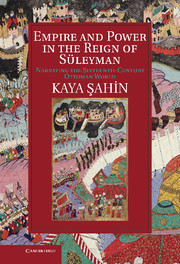Description
Empire and Power in the Reign of Süleyman
Narrating the Sixteenth-Century Ottoman World
Cambridge Studies in Islamic Civilization Series
Author: Şahin Kaya
A revisionist reading of Ottoman history during the reign of Süleyman the Magnificent (1520–66), examining the life of a bureaucrat, Celalzade Mustafa.
Language: English
Subject for Empire and Power in the Reign of Süleyman:
Approximative price 107.81 €
In Print (Delivery period: 14 days).
Add to cart
Empire and Power in the Reign of Süleyman
Publication date: 03-2013
Support: Print on demand
Publication date: 03-2013
Support: Print on demand
Approximative price 30.28 €
In Print (Delivery period: 14 days).
Add to cart
Empire and Power in the Reign of Süleyman
Publication date: 05-2015
Support: Print on demand
Publication date: 05-2015
Support: Print on demand
Description
/li>Contents
/li>Biography
/li>
Kaya ?ahin's book offers a revisionist reading of Ottoman history during the reign of Süleyman the Magnificent (1520?66). By examining the life and works of a bureaucrat, Celalzade Mustafa, ?ahin argues that the empire was built as part of the Eurasian momentum of empire building and demonstrates the imperial vision of sixteenth-century Ottomans. This unique study shows that, in contrast with many Eurocentric views, the Ottomans were active players in European politics, with an imperial culture in direct competition with that of the Habsburgs and the Safavids. Indeed, this book explains Ottoman empire building with reference to the larger Eurasian context, from Tudor England to Mughal India, contextualizing such issues as state formation, imperial policy and empire building in the period more generally. ?ahin's work also devotes significant attention to the often-ignored religious dimension of the Ottoman-Safavid struggle, showing how the rivalry redefined Sunni and Shiite Islam, laying the foundations for today's religious tensions.
1. The formative years (1490–1523); 2. The secretary's progress (1523–34); 3. The empire and its chancellor (1534–53); 4. Toward the end (1553–67); 5. Narrating the empire: history-writing between imperial advocacy and personal testimony; 6. Imagining the empire: the sultan, the realm, the enemies; 7. Managing the empire: institutionalization and bureaucratic consciousness.
Kaya Şahin is Assistant Professor of History at Indiana University, Bloomington. His research and writing have been supported by the Andrew W. Mellon Foundation, the Newberry Library, and the Social Science Research Council.
© 2024 LAVOISIER S.A.S.




